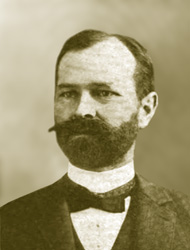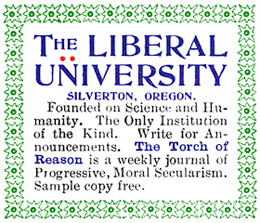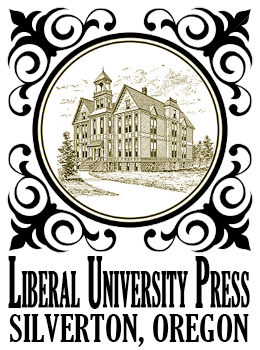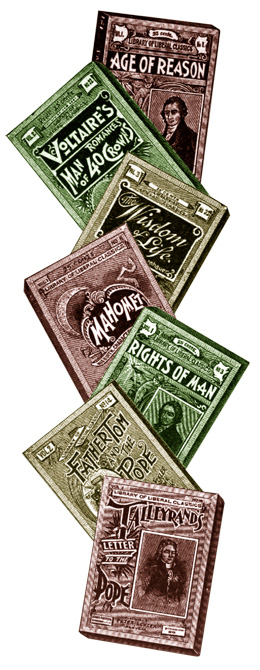By Walter Collins — February, 1903
 One of the most neglected questions that needs the attention of progressive people is funeral reform. The very first and most important step is to quit burying human bodies. Man is the only animal of his size that is permitted to pollute the earth in the very locality that others of his kind live and move and combat the evil influences of the retarded decay of the dear departed.
One of the most neglected questions that needs the attention of progressive people is funeral reform. The very first and most important step is to quit burying human bodies. Man is the only animal of his size that is permitted to pollute the earth in the very locality that others of his kind live and move and combat the evil influences of the retarded decay of the dear departed.
The brute creation, on their native heath, do these things better than the boasted “lords.” When one of their kind dies, they leave it, and the locality, severely alone, until the sun, air, worms and vultures have completed their work towards returning it to its original elements.
With the animals that man keeps in slavery he does better than by his brethren. Nearly all of the horses and mules are converted into glue, fertilizer or “canned beef’ for foreigners or soldiers, and what few are not utilized in some way are buried in the country, usually in an isolated place, where the deleterious effects are reduced to a minimum. Cows, sheep, hogs, man eats, which is somewhat better than burying, but not much. Dogs and cats are small enough to be readily absorbed by the soil, and thus are enabled to enrich plant life.
As these modes of disposal are not adapted to the human family, there is but one manner of disposition that meets sanitary requirements, and that common sense pointed out to our ancestors in the dim ages of the past, far beyond the earliest traditions that have come down to us, and that is, cremation.
As soon as man learned to make a fire, he worshiped it, and next in importance to keeping himself warm and cooking his meals, he burned the bodies of his dead as a sanitary precaution, but when priestcraft got a foothold, it was called “giving them back to God,” but the effect remained the same, of properly disposing of the contaminating poisons of decaying flesh, and it was, in fact, returning them to Nature.
With most all nations excepting the Chinese,—who are ancestor worshipers, and believe a body sleeps and is preserved by burial—cremation was practiced as far back as history and tradition gives any knowledge or clue, and until religion began to interfere in the affairs of men it remained a rational custom, but as the belief in the resurrection of the body became prevalent, the priests denounced cremation as “thwarting the will of God,” and, with the rise of that absurd doctrine, came the decline of cremation, and that class of believers became burial worshipers, and are yet wedded to their bigotry because it is “time honored,” which in religious matters is synonymous with musty or mildewed. They fear to dishonor the dead, as if such was possible; a person that slanders the dead or otherwise shows disrespect dishonors himself only, and the dead are only honored or dishonored by their own life. It is these false notions of dishonoring the dead to which I wish to attract attention.
There are two classes of people whose .business it is to perpetuate it, that useless human parasite, the preacher, and that human buzzard that makes merchandise of grief, the undertaker. Parasites, microbes and feathered vultures have a very important place in nature, but the priest and the undertaker are but mistakes in civilization; they are wrecks in the river of life and death, and the sooner they become but a memory the better for mankind.
When a person dies, what need is there for a preacher to deal out his doleful lies at so much per deal? Or an undertaker to suggest and almost insist to a grief-stricken family what the funeral conventionalities are? As soon as he is consulted, and sometimes before, he assumes the management of the dead and the living. The body must be removed to his “parlors,” at a cost of five dollars (no necessity for it at all), there to be “laid out” for another five, that could be done where he died by the same friends or relatives who assisted in his sickness, for when a man is so unpopular or too poor to have· friends when dying, the preacher and the undertaker fail to appear, unless where the bills will be paid by the county; then respect and honor is shown to the limit of the fee. Then comes “the revival of one of the lost mysteries of antiquity”—embalming—that has now become an indispensable adjunct to all fashionable funerals, at an expense of from ten to one hundred dollars, according to the wealth of the deceased or the gullibility of the interested survivors. Except where a body is to be sent to a distance, that is a useless operation, and retards a process of nature that should be hastened. Next comes the big black box that haunts to its dying day the mind of every child whoever saw a parent buried. It is an original Christian production, the like of which is not found in the heavens above or in the earth beneath; it even has an odor peculiarly its own, called the odor of sanctity. In selling a coffin, the keen commercial instinct of the long-faced ghoul shines the brightest. With a sob and a choke and a tear in his eye, he pleads with the widow, whose support is gone and has a family to keep, that it is her duty to the good, kind husband whom God in his Infinite mercy, has been pleased to remove, so she can show that she is worthy of the harp that awaits her, by proving her Christian zeal in battling alone and providing- for a family on nothing but faith. And what will the neighbors say?
To a niggardly spirit at this, her last time that she can publicly show her “respect.” A fine coffin must be had in keeping with her husband’s fine character, and he has a perfect beauty, solid rosewood, six large solid silver handles and a gold name plate, for $175.00, that he will let her have in this trying moment for $125.00. Oh! can’t afford it? Nonsense! Don’t mention money; a mortgage on the house or furniture will do. The woman hardly realizes what she is doing, and orders a veneered pine box that cost the professional sympathizer ten dollars.
That being settled, the hearse must be engaged. It is in style, and cost him $1,500.00, and to get interest on his money, he hates to do it, but must charge $15, or $25, for the trip of an hour or two. Of course in this Christian country no one is heathen enough to do without a hearse, for the funeral would not be “decent,” and the neighbors would talk about it for years, and it would look as if the widow thought more of the $25 than of her husband. Next comes the carriages; the bigger the parade the greater the respect. Besides, when neighbor Jones died they only had a dozen, so we must have twenty, at five or six dollars apiece, and in order to fill them we must advertise in the papers and send invitations to all his friends, and in small towns placard the trees, fences and post office. Business houses are expected to close during the funeral. The undertaker usually attends to the carriages, at a rebate of one dollar each.
Next in order is the selection of a burial lot or grave. A lot in or near a city, 7 by 10 feet, costs $100.00 and upwards, while a single grave, with “perpetual” care (that is, as long as friends or relatives complain), costs about $25, and five dollars extra for digging and filling. These details must all be attended to before the funeral ; also the crape on the door and windows, the dressing the corpse in the best suit of clothes he had, or, if that didn’t happen to be plain black, one must be bought especially for the occasion; and all of the family and friends must be dressed in somber black, and, particularly, the widow must be in full “mourning,” a ridiculous mass of veiling that is intended for a constant reminder for herself and her friends to keep their thoughts on the awfulness of death.
Happily, men will not be hampered by any such nonsense, and their mourning is very brief in extent and time. The three days’ preliminaries having been attended to in good form, and in consequence the widow is nearly prostrated, the funeral is ready to proceed from the house, the church or the undertaker’s parlors, where the star event is, that a preacher, who is oftentimes a total stranger, will, in a voice that sounds as if it came from the tomb, cheer up the widow and relatives by telling them what “God” has done and why he did it. “Whom God loveth he chasteneth” is a familiar chestnut, and what solace there is in that for the dead or living I fail to see.
When he is through with God, he turns to the living and endeavors to earn his money by giving the deceased a most immaculate character, whether he deserved it or not. Then the matinee is closed by a mournful song, and the crowning insult to intelligence, a sacred prayer. It only lacks a collection to make it truly and beautifully religious. In dismissing the people an invitation is extended to all to take a farewell look upon the features of the dead, which is intended to look “natural,” but which is as unnatural as human art can make it. The procession is then formed, and with a pitifully slow pace the cemetery is reached, where the chief attraction, next to the corpse—the preacher—gets off some more God nonsense, and the body is consigned to the grave, to pollute the earth, the water, the air, and carry contagion to the living. About the time it has done all the damage it can, the relatives have forgotten the virtues of the departed, and a new tenant comes to share his grave.
The crowding of thousands of bodies in our cities’ cemeteries cannot be too severely condemned, and the cleaner method of speedily transferring a body to its elements should be adopted by all who have any consideration for the living. Cremation has already broken the back of the time-honored custom of being “buried like a dog,” and it should be followed up by the abolition of the useless and extravagant tomfoolery that attends our Christian burials.
Let us treat the living better than we do, and when life is extinct have common sense prevail over prejudice and quietly and decently tender the body to the purifying retort, without publicly displaying our grief and advertising our “respect.” If the cause of death is not understood, an autopsy should be made, and if any portion of the body can be of any beneficial service to medical science it should be so used.
Death is as natural as birth and is equally the common heritage of all, and, when it comes, why not divest it of all useless and superstitions performances and treat it as a natural occurrence? Instead of a coffin, have a plain board stretcher with short sides to keep the body in place, and covered with an inexpensive dark cloth, the body to be placed thereon as if asleep, without being dressed in a suit of good clothes that would be useful to someone living. The body also can be covered with a plain dark cloth, features, only, showing. Within forty-eight hours after death the body should be taken to the crematory in a dead wagon, ambulance or any other convenient conveyance, all suggestions of a parade to be avoided. If desired, the near-by relatives and a few close friends could meet at the crematory, where a ·few remarks, not to exceed five minutes, might be made, and a last look upon the features for those who wish, but that is not advisable, as it is far more pleasing to remember a face as seen in life and animation. After cremation the ashes can be left at the crematory or sent to the house.
There is no necessity for an undertaker. preacher, priest, choir, gravedigger, prayers, hearse, funeral carriages, grave, headstone, monument, crape, mourning, floral emblems, funeral costumes, advertisements or any other ostentatious display, and the consequent nervous prostration and future financial embarrassment attendant upon a conventional funeral. In closing I wish to say that I have known many Freethinkers who wished to be cremated, or at least be buried without the usual ‘honors,” especially the preacher’s gush, but whose wishes were totally disregarded because there were no written instructions to that effect, and the relatives didn’t care to depart from the common custom for fear of the talk it might create.
Happily, my wife and children are courageous enough to ignore Mrs. Grundy, and are as radical as I am on religious and other reforms, so that I have little to fear but what my wishes will be carried out to the letter if it is possible to do so. That they may know just what I want done with me after death, I have written instructions in detail, properly witnessed and voluntarily endorsed by my wife, and attached to my will, the whole to be read at my funeral, thereby leaving no doubt as to my intentions and relieving all concerned of any possible embarrassment.
I hope this may induce others of similar trend of thought to take like action, for there is nothing that hurts the church so much as paying taxes, as to have funerals take place without religious ceremonies or tribute.





